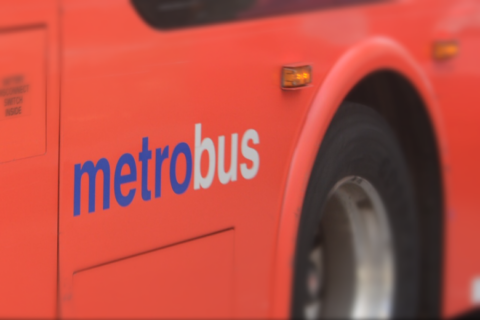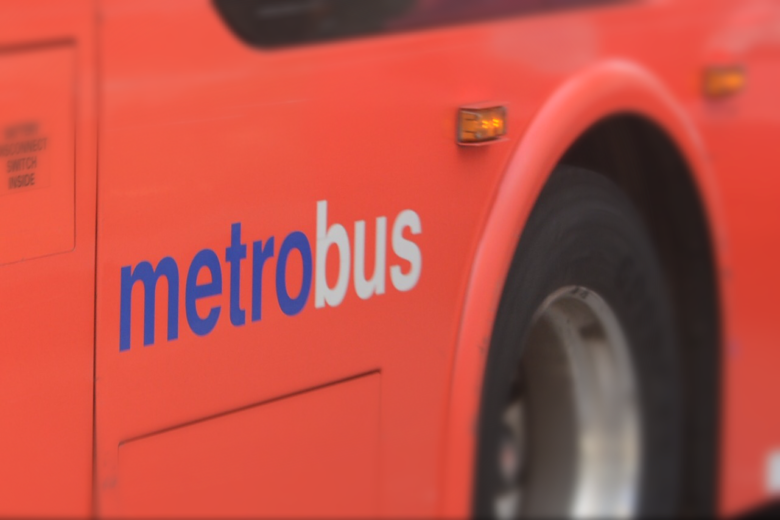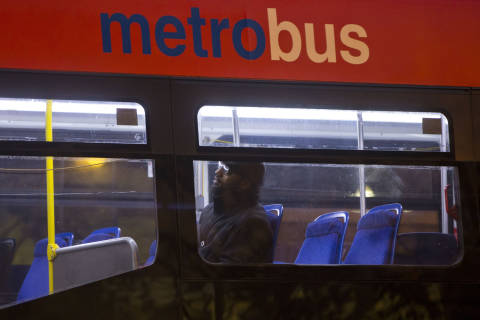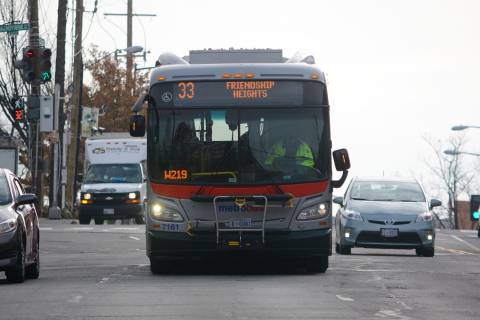
More bus lanes are in D.C.’s future amid a region-wide push to get buses out of traffic and improve rider experience, while also encouraging more commuters to use mass transit.
Officials from the District Department of Transportation and Washington Metropolitan Area Transit Authority met in recent weeks to identify the highest-priority streets for new bus lanes and other changes for fast results.
“I expect that, in the coming months, we’ll be announcing future projects, some on the larger scale, but we are really looking for those smaller, quicker implementation opportunities,” DDOT director and Metro board member Jeff Marootian said.
Examples of smaller-scale projects include the new bus lanes on H Street Northwest and I Street Northwest that were rolled out earlier this year by painting an existing lane and adding some new turn and parking restrictions.
Larger scale projects would include 16th Street Northwest, where construction will soon put in new concrete and pavement.
“It largely just depends, but it could be anywhere from $10,000 to $10 million,” Marootian said.
He declined to detail specific project locations just yet.
Metro has taken a renewed interest in bus lanes, particularly since it could save a significant amount of money in operating costs by allowing the same number of buses to serve more riders.
“We’ve begun much more aggressive coordination and partnership on bus priority in locations where we expect bus speeds and bus service will improve with quick investment,” said Tom Webster, Metro’s head of capital planning.
Starting this winter, Metro is set to begin discussions of a complete overhaul of the region’s bus network. Local governments will have input on how quickly that overhaul is rolled out.
The total changes for the region’s bus system are part of a new action plan proposed this week by the Bus Transformation Project team.
That group suggested that the total restructuring of the Metrobus and local bus system be completed by 2025, with an initial proposal by the end of 2020, and another mid-point milestone in late 2023.
Other suggested steps include adopting new regional bus standards and funding formulas within the next year, improved and standardized data by 2023, expanded on-demand microtransit by 2025 in areas where regular bus routes are cut, and additional Metro financial support for bus lane construction by 2021.
Other suggestions to start immediately include improved bus lane violation enforcement, consolidating real-time bus information in one place, renaming routes across the region, discounted fares for low-income riders, and expanded regional bus passes.
“Really, the top issue for customers who take the bus, who used to take the bus, and who would like to take the bus, [is that they] want to see frequent and convenient bus service,” project consultant Rich Davey said.
Better service would convince some skeptics to get on board and out of traffic.
“A lot of what’s in this action plan is not new. The transformation doesn’t need to be all focused on technology and bells and whistles. The transformation that we’re looking for is a radical re-commitment to the bus,” Eno Center for Transportation President Rob Puentes said.
Arlington and Alexandria have already dedicated bus lanes as part of Metroway, and Northern Virginia transit leaders hope to use more temporary bus lanes during future 24/7 Metrorail shutdowns.
Montgomery County, Maryland, has potential plans for several bus rapid transit lines, including starting next year on part of U.S. 29.
The Bus Transformation Project’s recommendations no longer directly include a controversial push to shift Metrobus routes onto local bus operators or vice versa, and also have dialed back the insistence on a new regional bus oversight body.
The initially proposed shifts were among the reasons riders in several parts of the region had heightened concern that many bus routes would simply end up being cut.
“I would invite you to come to Prince George’s County and speak to our partners out there. Certainly there is a lot of concern with the report, with the project,” Maryland Metro Board member Thomas Graham told Davey and Puentes.
The plan is now going to local jurisdictions for endorsement. The Metro Board is expected to endorse the plan next month.
A business group that sparked a dedicated funding deal for Metro after years of inaction also remobilized this week to support the bus overhaul plan.
“There is a fight here in the region for limited space, and that is the roads that you have,” Davey said.
Bus Transformation Project leaders are now calling for a “supercharged” effort for bus lanes and other improvements, after only slow, incremental progress over the last decade.







